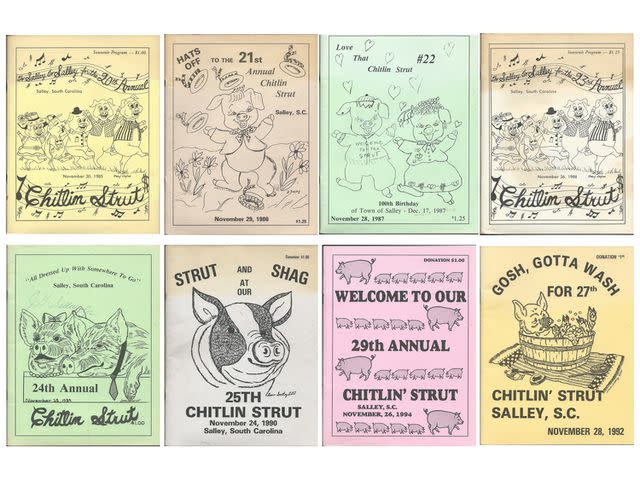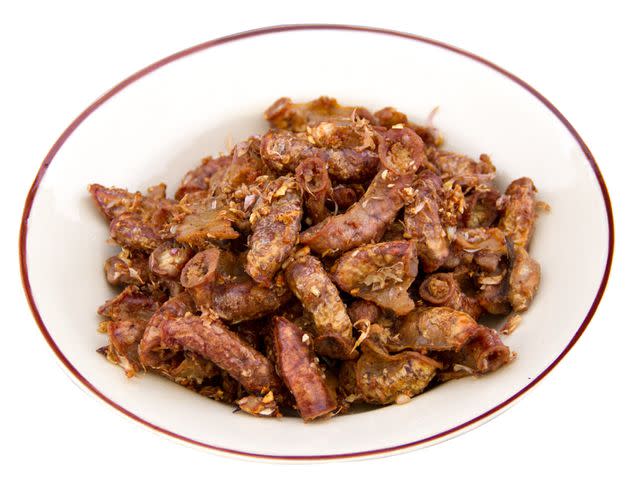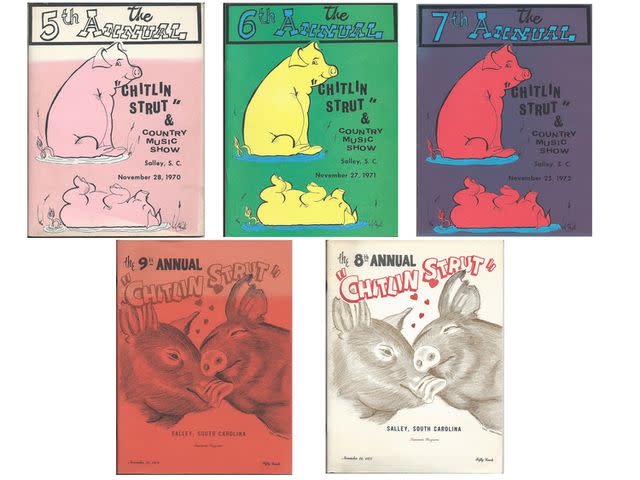Doing the Chitlin Strut
Mired in the stench, people danced, drank, shared stories, and fell in love, all in the name of a single iconic dish.

My daddy first told me about the Chitlin Strut when I was a teenager. We were driving inland from Charleston, our gold F-150 heavy with watermelons to sell at our produce stand back home in Spartanburg. We meandered down one-lane country roads, taking our time and eating pork skins, drinking RC Cola, and telling one another stories—mostly half truths about things we'd heard, trying to top each other with our outlandishness, but getting mired in the details.
But as we passed the sign for Salley, South Carolina, he told me a new story, one his mother used to tell him: how, on the Saturday after every Thanksgiving, my grandmother would join the thousands upon thousands of people who converge each year on Salley in celebration of the notoriously stinky preparation of hog intestines known as chitlins. Mired in the stench, people danced, drank, shared stories, and fell in love, all in the name of a single iconic dish. And, though he himself had never been, to hear him tell it, you could catch a whiff of the Chitlin Strut all the way from the interstate.
I didn't doubt him for a second: When I was growing up, folks used to say that the odor of chitlins cooking was so strong that even the leaves on the trees would turn the other way to escape it. The cleaning and cooking process does indeed produce a constant, unmistakable funk, an ever-present blend of fecal matter and hot fat, heightened by sulfur and tinged with sweat. But none of that mattered to my father, who was raised on chitlins. He loved them until the day he died, almost three years ago.
His affection for chitlins was hardly a surprise. For my family, nose-to-tail, farm-to-table dining has never been a trendy movement—it's how we've sustained ourselves for hundreds of years, and my paternal side has raised and eaten hogs as long as anyone can remember. But despite his passion for chitlins, Daddy never did make it to the Strut; he was never in the right place at the right time. Which is part of why I'm headed to Salley this late November weekend, more than a decade after that lazy afternoon drive. It's an homage of sorts, but I'm also just plain curious.
Even though I've lived in rural South Carolina for the majority of my life, as an Ivy League-educated, upwardly mobile African-American woman, my world and my taste buds have always been far removed from chitlins. Both my paternal and my maternal grandmothers cooked chitlins, but my mother—the primary cook in our house—refused to make them for my father, so I didn't grow up with the smelly soul-food staple. My mother has always insisted that there are better, healthier, and sweeter-smelling things to consume than what she and many other black middle-class people demean with the term "slave food."
In fact, I'd only tried chitlins once before, as a child, courtesy of a church friend named Miss Ruby, who'd brought over a plate for my father. It was piled with turnip greens and chitlins in gravy, liberally spread over Carolina rice and so heavily spiced that it smelled more of peppers and vinegar than anything else. Ruby told me she used cinnamon to take away the "stank" normally associated with the food. Daddy urged me to try some, and, after a bit of cajoling, I finally picked up a slice and put it in my mouth. Only then did the smell emerge from the veil of spices, pungent and ripe. I gagged, struggling to chew through the rubbery bite. Face flushed, feeling thoroughly disgusted, I decided chitlins weren't for me. For many years, that was that.
Certainly nobody pressed me to try them again. With plenty of more palatable, socially acceptable options available on the cheap, it's become easy for younger generations to reject chitlins, not only for their texture and aroma but because, for many, the dish can serve as a strong reminder of the hardships the generations before us endured. Chitlins belong to the American food landscape that existed before the national highway system, chain restaurants, and frozen food. In many ways, eating them today means reckoning with the past, and with an inheritance that none of us asked to carry.
For slaves on the edge of starvation, poor-quality food and leftover scraps like innards were too useful to be ignored or thrown away. Instead, slaves made do with unpalatable items that were often bland, tiresome to prepare, and somewhat indigestible. They did their best to turn offal into flavorful and nutritious dishes by supplementing meager rations with peppers, spices, and vegetables like okra. In other words, they made the most of what they had, even when all they had was the intestines of a pig. For some, like my mother, this makes chitlins slave food. But for me, the fact that these recipes have been handed down from generation to generation, through political, economic, and racial struggles, speaks to a cultural tenacity and vibrant oral tradition that I'm determined to honor—even if it stinks to high heaven.
It's early afternoon when I park my car on the edge of an embankment right outside Salley town limits. I brace myself for a sensory assault, but the air is crisp and fresh—only later do I find out that the town has passed a new ordinance prohibiting anyone who isn't associated with the festival from cooking chitlins on the grounds. Relieved that my meeting with what I've dubbed "The Smell" has been delayed, I hustle toward the parade route, eager to see what the event has in store.
The sun is out, the winds are fair, and it's a beautiful day. Thirty thousand people are set to descend on Salley (population 398). People cluster around the edge of the road as decorated golf carts and fire trucks stream by, showering the crowd with candy and beaded necklaces. The parade is a small, unorganized affair—the vehicles start, stop, and occasionally idle, which gives the operators plenty of time to interact with the crowd. Trucks adorned with holiday bows are full of cheerleaders and football players, decked out in their Friday-night best. Salley's version of the Clampetts ride by in a golf cart, hillbilly music blasting from a jerry-rigged speaker, shotgun lashed to the windshield and a sewing machine attached to the roof. The air is filled with whoops and hollers; daredevils on souped-up golf carts and motorcycles whiz past to the tunes of Lynyrd Skynyrd and Michael Jackson.
I hadn't been sure how racially diverse the event would be—even though chitlins are often thought of as an African-American foodstuff because of their origins, the Chitlin Strut was founded by a caucasian mayor who was looking for a new way to raise money for the town's Christmas decorations. At the time, Ben Dekle—a local white radio DJ and friend of the mayor's—declared that he'd always wanted Salley to host a chitlin-themed strut, but nobody had had the "guts" to do it. The city council decided Dekle's idea was crazy enough to work—chitlins were cheap, and besides, what did they have to lose?
From his dare emerged the first Chitlin Strut, a bit of tacky Southern bravado that people were unsure would last, but wanted to be a part of while they had the chance. And so, on November 26, 1966, 600 pounds of chitlins were served, along with platters of barbecued pork and chicken. The event was featured in Southern Living magazine and in newspapers as far away as Paris. It proved so successful that it became an annual celebration, run by the local government to raise funds for municipal purposes. According to Salley's town clerk, this year's festival-goers will consume over 10,000 pounds of pork intestine.

The hosting organization is still predominantly white, but as best I can tell, the crowd is easily three-quarters black. Cars sparkle, men flex, and music pours out of stereo systems the way liquor will flow later. The cast of Lizard Lick Towing pose for pictures and sign autographs, and The Black Cowboys, the final act, gallop down the street on their horses in full regalia.
When the parade is over, the fairgrounds open up and massive lines form: It's chitlin time. One by one, people hand the cashier $10 and head for the fully enclosed shed on the edge of the fairgrounds, appropriately dubbed "the chitlin house." There, the intestines are cleaned and cooked—an efficient setup when it comes to containing The Smell. I take my time, though, circling the grounds while The O'Kaysions prep the crowd for an afternoon of old-school R&B and jazz.
Two songs into their set, the fairgrounds are packed, and it's standing room only for the rest of the day. Lines stretch along the fence and toward the exit for various food vendors. For those uninterested in the plat du jour, there are smoked turkey legs, fried fish, and barbecue on which to feast. Chefs display ornate desserts in bids for attention from those looking for something sweet to balance their palates. Bass thumps, lines form, and friends greet each other with a "hey y'all" before launching into the latest bits of gossip. While standing in line for lemonade, I learn that Ricky ran off with Ella, Troy blew his finger off with fireworks, and Rita won't stay unless George gets her a new dog and fixes the deck. More than once, somebody's momma cries, "Hold my purse, this is my sooooong!"
The odor of chitlins comes and goes—never brutally obtrusive, because, this early in the day, people are just passing through with to-go plates, the musty funk leaking from the crevices of their Styrofoam containers. I find myself torn, determined to immerse myself but utterly unprepared to order my own plate of chitlins, let alone take a seat in the house itself. Cautiously, I walk around the side of the shed and press my face against the glass, watching as people dab vinegar over their plates of boiled chitlins, and dunk fried bits like potato chips into hot sauce. From my side of the window, things don't seem so bad. Here, I think, I am safe.
I am wrong.

I smell the plate of chitlins from behind me before I can stop myself from breathing. I choke at the shock, the overwhelming onslaught of funk. I turn as a tall, pecan-tan gentleman with graying temples apologizes for startling me. He introduces himself as Ronnie. I don't have the extra air to explain to him that his presence isn't my problem. "Want a bite of my chitlins?" He thrusts the box toward me.
Allow me to be clear: I never turn down food. I snap up every chance I can to stimulate my taste buds, and I'm generally an adventurous eater. But, despite months of anticipation and mental preparation, I'm paralyzed. If Miss Ruby's chitlins, diluted with sauce and smothered with spices, engendered such disgust, how would I handle them now, bare-bones as can be? Southern social protocol dictates that whenever somebody offers you something to eat, you accept it and try it, regardless of whether or not you're really in the mood. I should smile politely, take the box, and have a bite. I smile politely. I take the box. And then I stall.
Ronnie tries to make small talk while I gather the nerve to put the pale mixture in my mouth. I kill time by adding hot sauce. I don't like hot sauce, but it's something to do with my hands, and I tell myself that the tang and spice might cut through the thick, rubbery meat. The presentation is slightly sloppy; juice runs down the edge of the Styrofoam container and drips onto my boots. White-knuckling my fork, I dig into the box and come up with a scoop of wiggly, jiggly intestines and onions clinging to bits of rice. I shove the forkful into my mouth before I have the chance to second-guess myself. The roof of my mouth burns; my tongue flounders. Eventually, my mandibles take over, chewing madly, wildly, trying to get the food into my digestive tract before my brain can initiate my gag reflex.
Ronnie pretends not to notice and keeps chatting me up—about his hometown of Rock Hill, and how he comes to the Strut with friends every year to recover from the stress of Thanksgiving. My forkful finally swallowed, I thank him, and promptly ask him why on earth he eats chitlins.
"I grew up eating them, so I like them all right," he says. "But you can't eat just anybody's chitlins. You gotta trust the cook you're eating them from." I explain to him that this is my first time at the festival, and only my second interaction with chitlins.
When he asks if I've been to any of the block parties and jazz squares outside of the festival, I give him a look of befuddlement. I didn't know there was anything going on outside of the festival grounds. "Baby girl, do you think all these people come here for a couple of slices of meat and some rice?" Ronnie gives me a grin. "Let me show you where the real Chitlin Strut is."
Sidestepping motorcycles and cutting through the thick smoke from barbecue grills, he tells me all he knows of the history of the Strut. Beyond the fairground proper, there's a sea of black faces as far as the eye can see. Ronnie shows me around, hopping from block to block, waving at people playing spades in front of their RVs. The sizzle of warm fat meeting hot coals greets our ears, and at the local gas station, a DJ has the area packed to maximum capacity. The crowd sways and rocks so hard that the signage bounces against the building every time the beat drops. The whole town is a party, and it feels like all of black South Carolina has come here to celebrate. This is the type of environment my father thrived in. He would've been shuffling cards and making friends—a plate of chitlins at his left elbow and a cup of sweet tea at his right. I wish he could've seen this. I blame my tears on the unexpected grill smoke.
We make our way to the edge of town, where a church is selling plates of food—here, and a couple of other secret houses around the town, Ronnie tells me, is where you get the good stuff. The church is closing down their operations for the day, but I vow to get here earlier next year.
On our way back to the fairgrounds, Ronnie links up with some of his friends, and they start sharing stories of nights brimming with moonshine, riding with the Black Cowboys, and fish frys on the edge of Lake Greenwood. They pour a little home brew into my lemonade as guitars twang and thrum onstage. Jimi Hendrix got his start in venues like these, and at events centered on chitlins. When he played with the King Kasuals, they started working a series of black music clubs a few hundred miles outside of Nashville. The joints often had potbellied stoves and served chitlins to the crowds. As a group, these small southern clubs were known as the Chitlin' Circuit. Hendrix perfected his showmanship in those spaces, brushing elbows with the likes of "Gorgeous" George Odell, Aretha Franklin, and the Isley Brothers.
As afternoon fades into evening, many of the Strut attendees start filtering out toward block parties. I part ways with my guide and his friends, exchanging hugs with folks who were strangers that morning. I spend some time wandering about town, eventually ending up beside the pond on Hartley Drive, thinking about all I'd seen in a day.
South Carolina's state motto is "While I breathe, I hope." In many ways, South Carolina—where both my parents and I were born and bred—is still seen as a backwards, off-the-beaten-path state, high in domestic violence and low in economic opportunities. As always, the numbers don't tell the whole story. South Carolinians—and the Southern foods they love—are more nuanced and particular than that.

After my day at the Chitlin Strut, I realize the term "chitlin" really means "a sense of belonging." Throughout history, spaces that held chitlins at their center allowed black people to laugh uninhibitedly at a time when white faces conjured up intense anxiety. Through years of racial segregation and persecution, these places—whether a small juke joint or a cluster of RVs—served as our safe spaces, where people of color could socialize, get a decent plate of food, relax, and enjoy themselves. The Strut, and the events around it, served up soul-nourishing hospitality that I didn't know I needed. Chitlins might not be my offal of choice, but my experience at the Chitlin Strut has made me feel part of a larger community that has little to do with the actual food and everything to do with my ancestry. When I get back in the car, I look at the calendar in my phone and add an event: November 26, 2016. Next time, I've got to try the fried chitlins.
February 2016

